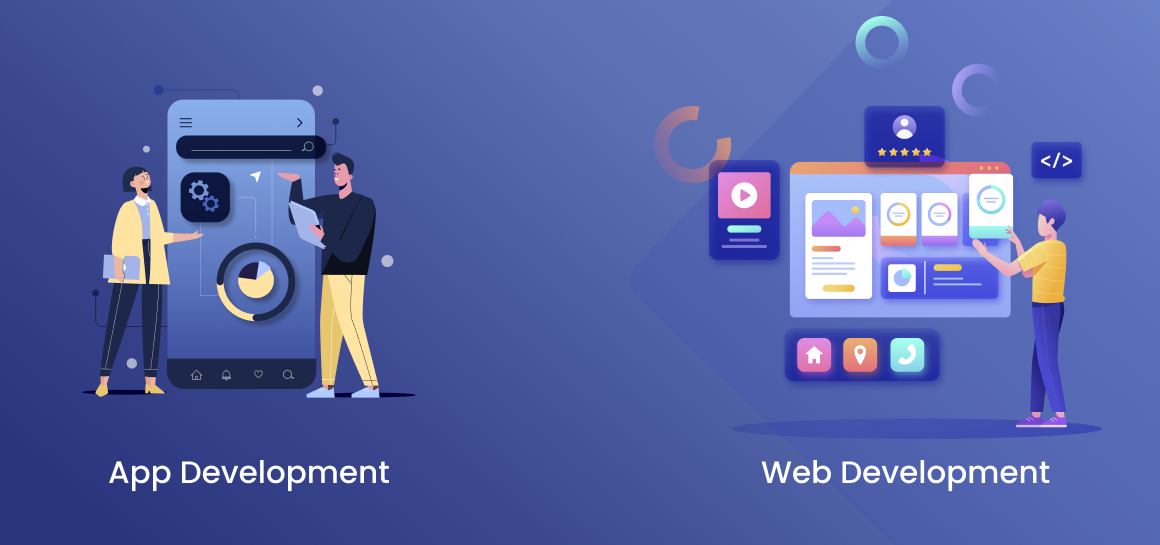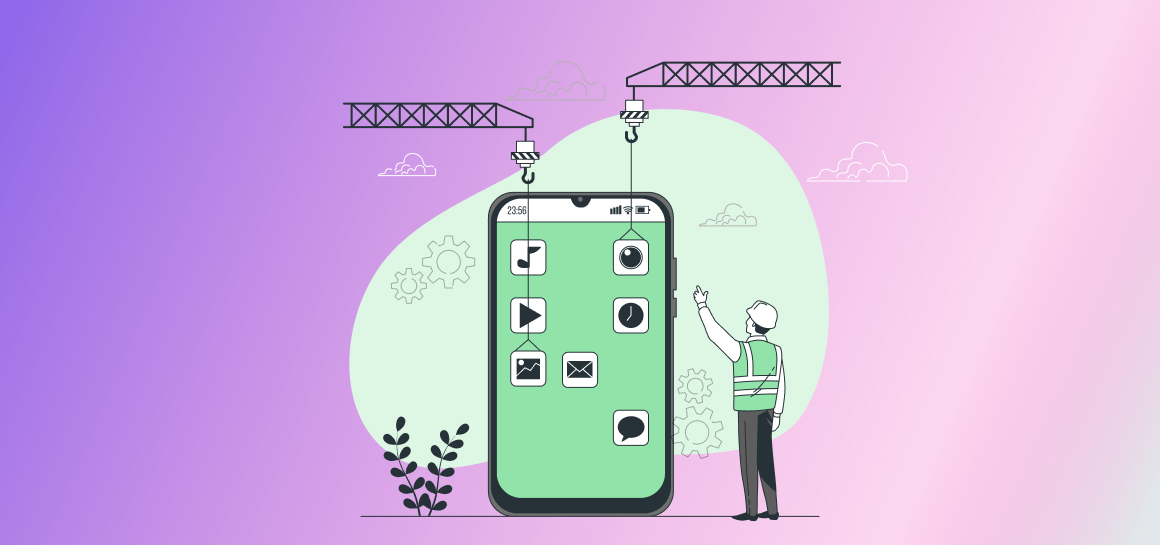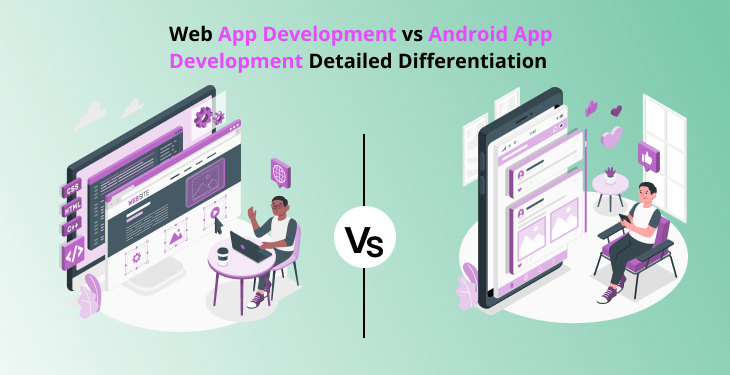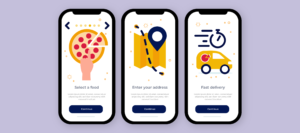Web App Development vs Android App Development Detailed Differentiation in Just 10 Steps
Are you confused about web app development and android app development?
It’s a popular misconception that web and android apps are interchangeable but incredibly distinct.
It’s crucial to make sure the two are clear because there are variations between them, not just for the user but also in the development and deployment processes.
However, it can be helpful to first distinguish between websites and web applications. As described, a web app is a website that is responsively intended to be accessed on a smartphone. There are numerous distinct kinds of websites; some are static and infrequently updated, while others are responsive and have a lot of interaction. Mainly web apps perform like downloading apps but from the convenience of your phone’s browser.
But how do android app and web app development differ from one another? Let’s look at Web App Development vs Android App Development.
Web App Development vs Android App Development
| Android App | Web App |
| Android Apps are comparatively faster. | Web Apps are comparatively slower. |
| Android apps have more safety and security. | Web apps have comparatively low security. |
| The expense of maintaining and regularly updating android apps is higher. | Automatic or self-updating updates are available for these apps. |
| Apps for android devices may function offline. | Web apps require an active internet connection to function. |
| It’s challenging to get Play Store approval for an android mobile app. | Web apps can be simply launched because the App Store’s approval is not necessary. |

On the other hand, web apps are accessed through an internet browser and will adjust to the device you are using to see them. They don’t require downloading or installation because they are not built into a particular operating system. Confusion arises because of their responsiveness; they resemble mobile apps in appearance and functionality.
These are effectively two different items, even though the designs are identical and use the same fonts and colour palette.
In this Web App Development vs Android App Development, Android apps can function without an internet connection, web apps require one. Android apps offer the benefit of being quicker and more effective, but they do necessitate frequent update downloads from the user. Web applications will update on their own.
Above all, there are significant differences in Android App Development vs Web App Development. Therefore, it is helpful to comprehend how each is created to further distinguish between them.
How are Android Applications Created?
Since they are platform-specific, android applications are more expensive to create than web apps. Design and development must start over to launch an app across several platforms. However, they move considerably more quickly and frequently have more sophisticated features and usefulness.
How are Web Apps Created?
Non-native technologies were purposefully developed to eliminate duplicating code and to enable more developers to create apps. JavaScript, CSS, and HTML5 are typically used to create web applications. There is no standardized software development kit for creating web apps, in contrast to mobile apps. However, templates are available to developers. Web App Development vs Android App Development explains that Web apps are typically quicker and easier to develop than android apps, but their feature sets are far more limited.
Progressive web apps (PWAs) are a new trend that uses current browser improvements to make web apps more similar to android apps. However, operating system support and functionality are still restricted compared to actual android apps.
Pros and Cons of Android App & Web App
We can summarize the pros and cons of each now that we are aware of the critical distinctions of Web App Development vs Android App Development:

Pros of Android Apps
- Quicker than web apps
- Due to access to system resources, they function more effectively.
- Can work without Internet
- Safe and secure – the app store must first authorize native apps
- Due to the availability of development tools, interface components, and SDKs, more accessible to construct
Cons of Android Apps
- More expensive to create than web applications
- Typically, designing and building the app from scratch is required.
- Expensive to upgrade and maintain
- Getting a native app authorized by the app store could be challenging.
Pros of Web App
- Web apps operate in the browser and don’t need to be downloaded or installed.
- They are simple to maintain because they share a codebase across all mobile platforms.
- Will provide updates
- Faster and simpler to create than mobile apps
- Quick to launch because they don’t need app store clearance.
Cons of Web App
- Don’t work offline
- Less advanced in terms of features and slower than android apps
- Since they are not included in a specific database, such as the app store, they may not be as easily found as android apps.
- Web apps do not need to be certified by the app store, so quality and security are only sometimes assured.
Things to Consider Before Building an App or Website

1. Do you wish to connect with additional users?
Compared to an android app, a web application can help you reach more users. Let’s examine the Google search volume for a US-based online and mobile analytics provider to demonstrate this.
Only 21% of visitors to their website use mobile devices; the remainder uses desktop and tablet computers.
However, if we stick with the Android app, we would only receive 8% of our present users. If you click on Android in Google Analytics, you can see that this OS is installed on roughly 70 distinct types of devices.
Web apps are available online, just like websites, so you can quickly boost their popularity using the same advertising and social media techniques (like SEO and Google Ads). Android apps can also be promoted on social media, but customers will still need to go to the Play Store and download your app. With web apps, the conversion process is more straightforward.
2. Are app speeds important?
In Android App Development vs Web App Development, Web apps are slower than android apps. This is because Android apps locally retain user data settings on the phone. On the other hand, web apps download information from servers. As a result, the user experience will be at its finest when using native mobile apps in terms of performance.
This time, the android app is the undisputed winner in comparing android apps and web apps.
3. Will your app’s user visit more than five times each day?
It makes more sense to start with an android app if you anticipate that users will use it several times daily. Then, users benefit from far greater convenience, quicker access, and notification updates.
However, one typical obstacle preventing users from using your app is delayed app load, log-in, and activity times.
Most of these items, including games, notes, to-do lists, reminders, alarm clocks, e-mail, and social media, are advised to have android apps. Throughout the day, you’ll communicate with them frequently; therefore, you want no lag.
4. Does your rival have an android app?
This could be the USP (unique selling proposition) of your company. Everyone else will be concentrating on web platforms or providing an average solution for each platform accessible while you exclusively focus on mobile systems.
For instance, if someone creates a to-do list application for a desktop or tablet, you may concentrate on providing the most outstanding smartphone experience.
5. Do you anticipate regularly upgrading (enhancing) your app?
If so, you should unquestionably start building a web app. Later, instead of investing in android apps, you may invest in cross-platform applications.
Each update for android apps requires consumers to download it. When you update the content on your end, web apps update automatically.
6. How frequently will consumers use your product offline?
Still a regular issue, with limited internet connectivity. Making a web app is not the best choice if you wish to access places with connectivity issues. It might be about niche markets or geographical areas; perhaps people will frequently use your app in trains, gyms, and forests. As a result, mobile apps are superior to online apps in this struggle.
Develop an android app so that the user can obtain the desired data anytime they need to if your solution primarily caters to people who want to use their devices offline.
7. Do you consider rapid development and launch to be important?
Web apps can be created more quickly since only one digital product needs to be created that will function similarly across all platforms and operating systems. In android applications, you have to create a unique application for every operating system and customize it for different devices.
Which is More Expensive: Developing Android Apps or Web Apps

Given that the complexity of a product ultimately determines the cost of application development, this is a complex topic to answer.
Web apps typically cost less to produce since they share similar codes across various devices, whereas android apps typically cost more to develop because they are designed from scratch.
Tip for Application Development
Both Android App Development vs Web App Development can be monetized. For example, a user could have to pay to get android apps featured in an app store. Additionally, even if the app is free, they can provide paid in-app subscription models (like Premium or Plus versions). Web apps run inside web browsers and may include advertisements, promotions, and subscription choices.
Which has More Scope for the Future?
Web App Development
As every industry’s online presence grew in recent years, so did the demand for web developers.
The developer is in charge of maintaining the website’s back end and creating the website itself. Web developers are becoming ever more necessary as e-commerce continues to grow. You can obtain employment quickly if you are qualified for web development work.
Web developers are required in practically all business sectors. Therefore, the website’s SEO should be understood by web developers as well.
Android App Development
The need for mobile app developers is skyrocketing. Since mobile apps are readily available and help businesses adopt new technology, they have a stronger connection to their customers.
You will have a lot of opportunities whether you work with iOS or Android developers. There is no question that this industry is expanding quickly globally. Therefore, there is a broad range of professional opportunities for those who design mobile applications.
When choosing is still tricky, there are alternative possibilities
Progressive Web Apps
Progressive Web Applications could help you decide whether you’re having trouble. They are created similarly to typical web apps, but they can be added to the home screen. It serves as a replacement for downloading a mobile app from the app store. They function with a weak internet connection or even offline after being installed on a device and have the look and feel of mobile apps.
Cross-platform app development
Another choice is to create cross-platform apps, which can be developed more quickly for various platforms and devices. You can utilize tools like React Native to create hybrid apps. Like native mobile apps, hybrid mobile apps can access device functionalities. They are created using JavaScript, HTML, and CSS and then packaged for various platforms.
The advantages of hybrid apps are apparent:
A single platform – Imagine updating apps separately for Android, iOS, and Windows Phone.
No waiting – The app store deployment process, which typically takes 1 to 5 days, is not required.
Not addressing problems – After uploading it to the server, you receive the outcome immediately.
Final Words
Undoubtedly, the future of Android App Development vs Web App Development is bright. The whole list of factors you should take into account before choosing your vocation in the web or mobile world has been analyzed in this blog. We considered the two fields according to their difficulty, professional reach, flexibility, level of specialist research, pay rates, and most recent trends.
You should be aware of the developments that will likely be applied to creating web and Android mobile applications in the future. The information we’ve provided on the Web App Development vs Android App Development careers will help you make wise decisions.
FAQs
Question 1: Which is preferable, android apps or web apps?
There is no simple response to that query because your business needs should be considered. For example, when you require an app that is accessible offline and makes advantage of device functions like GSP, android apps are preferable. On the other hand, web apps are preferable when you want to create a flexible product fast and publish it and when you want to update often and improve your app.
Question 2: What Distinguishes a Web App from a Website?
Web apps perform more like a native apps than a website since they are created expressly to be read on mobile devices. Therefore, when accessed on a mobile device, they are often quicker and more responsive than a regular website. Furthermore, in contrast to web pages, which are static and accessible to all users and devices, web apps are designed for user interaction.
Question 3: Are android apps safer than web apps?
Since they are held on the device itself, android apps are typically more secure. On the other hand, web apps are more vulnerable because they are hosted online. But a competent development team may take the proper security precautions to make a web app even more secure.
Question 4: Which is More User-Friendly: Android Apps or Web Apps?
Since android apps don’t need a live internet connection to function, they are frequently quicker and more dependable than web apps in terms of User Experience (UX).
Web apps are frequently slower and less effective than android apps because they depend on an internet connection. In addition, they typically have a less advanced feature set.
Question 5: What Platforms Are Web and Mobile Applications Built On?
Despite being created for different platforms, such as iOS and Android, both web and mobile apps have different levels of universality. Mobile apps are written in platform-specific languages, such as Swift for iOS apps and JavaScript for Android apps because they need different versions depending on the platform.
Web apps, which are often created in languages like JavaScript, CSS, or HTML5, are easier to create because they need a single cross-platform version.




